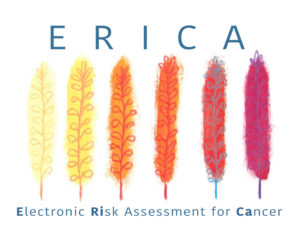Impact of decision tools for early cancer diagnosis in general practice on GP workload and patient ‘flow’ during consulting sessions (PhD)
Start Date Jun 2019
Code E13-Aff, PhD
Status Ongoing
Delay in diagnosing cancer in general practice causes big problems for cancer death rates. Research into which symptoms of cancer are likely to be important has led to the development of Risk Assessment Tools (RATs) that give a percentage score showing a patient’s risk of having a particular type of cancer, per symptom in question. Electronic RATs (eRATs) are now available within GPs’ computer systems and the ERICA trial will investigate whether they are effective in reducing delays with cancer diagnosis, and also whether they are cost-effective.
GPs manage a high and rising workload, due to the ageing population and more patients having multiple conditions. Decision tools such as eRATs offer an opportunity for GPs to be supported in how they manage risk of a patient having undiagnosed cancer, but we do not know the impact of using them on GPs’ workload. For example, we do not know whether using eRATs will have a knock-on effect on the length of consultations, or indeed the duration of the whole morning or afternoon clinic. Further, it is not known whether GPs use eRATs to start a conversation with a patient where their underlying cancer risk is below the level where action would normally be taken.
This PhD project will explore these issues by collecting information on consultation timings of real consulting sessions and also by presenting pretend scenarios to GPs to find out which circumstances would lead them to start a conversation with a patient about risk of underlying cancer.
Funding
Dennis and Mereille Gillings Foundation award – £15,009 per annum
Aims & objectives
The project aims to explore the impact of GPs using eRATs on the discussion of varying levels of cancer risk with patients, and on GP workload and patient ‘flow’ through consulting sessions.
Objectives:
- Compare the length of consultations in which eRATS are used with those in which the tool is not used, and for patients with varying levels of risk of underlying cancer
- Determine the impact of varying levels of underlying cancer risk and use of eRATS on a whole consulting session (for example in patients seen subsequent to those in who eRATs has been used) in terms of duration and experience of care.
- Explore with participating GPs whether they would initiate discussions with patients regarding risk of underlying cancer at varying levels of risk, including risk scores below 3%.
Methodology
A sample of GPs from ERICA intervention practices will be recruited and asked to complete a symptom checklist and make a judgement regarding risk of underlying cancer for every patient they see for a period during data collection for the trial. Consultations in which the symptom checklist and cancer risk score indicates an elevated likelihood of underlying cancer will be identified. Case notes reviews would be undertaken for these consultations in order to determine: (i) consultation length, (ii) eRATs risk score (where eRATs were used), and (iii) ordering of investigations.
Written vignettes will be designed to explore scenarios in which GPs would discuss cancer risk with a patient and/or act on an eRATs risk score of varying levels, including below 3%. In line with Howie’s work on sore throats and antibiotic prescribing14, vignettes will be presented to each participating GP, whilst varying key patient characteristics associated with the vignette (ethnicity, gender, socioeconomic status, eRATs risk score).
Outputs & impact
Planned outputs include academic journal articles, conference presentations and the final PhD thesis.
The findings of this study will contribute to understanding the findings of the ERICA trial and highlight potential barriers to implementation of eRATs for cancer diagnosis in general practice.
Next steps
The precise timetable of work is still to be determined, but broadly the milestones will be:
• Literature review
• Plan methods for capture of timings data
• Ethics and regulatory approvals
• Develop vignettes with clinical colleagues
• Identify and recruit GPs
• Complete fieldwork/data collection to within trial follow-up.
• Analysis
• Write-up and dissemination
Related projects



